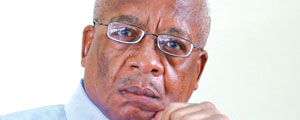
Has the dam finally burst? Information minister Jonathan Moyo might have started something good after he decisively moved to stop the rot at the Zimbabwe Broadcasting Corporation (ZBC) where the chief executive officer (CEO) was paying himself a fortune of $40 000 a month while workers went without salaries for months.
ECHOES BY CONWAY TUTANI
Now, management at Air Zimbabwe has been caught in a multi-million dollar fraud scam and all the while workers were suffering because the airline had been declared technically insolvent.
More is sure to unfold because corruption has become systemic in this country. But could anything beat the $230 000 monthly salary Premier Service Medical Aid Society (PSMAS) CEO Cuthbert Dube — who has since been fired — was paying himself while doctors turned away ill members because of unpaid services? So, for someone to say “Don’t judge Dube harshly” (as one journalist wrote this week) is to belittle the issue and an insult to all right-thinking Zimbabweans.
People are not blind or stupid. Even when Dube was funding the national football team from his pocket, discerning people were asking questions and PSMAS members couldn’t have been impressed.
Even if we were to accept that Dube has done some good, this is completely nullified by the salary revelations. His “generosity” pales into insignificance in comparison to his greed. What other word can be used except “greed”? It may be further asked: Was it genuine altruism on his part to fund the national football team from his own pocket or the money had become too much he didn’t know what to do with it except throw it around in conspicuous consumption?
There is something about easy money that makes people show off.
Dube was also ZBC board chairman when the CEO pay scandal broke and Moyo pointedly criticised him for presiding over the rot. Dube is still Zimbabwe Football Association (Zifa) chairman where he had raised the nomination fee for board member elections to $10 000, effectively shutting out those not moneyed. Now, if an individual can straddle across all those different, strategic organisations, it points to one thing: He has attained Godfather status, calling the shots left, right and centre. Two of Dube’s team at PSMAS — Mavis Gumbo and Nick Munyonga — are also at Zifa with him. Not exactly a nosa costra?
- Chamisa under fire over US$120K donation
- Mavhunga puts DeMbare into Chibuku quarterfinals
- Pension funds bet on Cabora Bassa oilfields
- Councils defy govt fire tender directive
Keep Reading
But it must be asked: Who enabled these executives because this grand corruption did not take root overnight, but over time?
Now, Zimbabwe ranks among the most corrupt states in the world and the settling-in of the vice can be traced to that period.
Has the liberation movement lost its way? Liberation was not born out of an extraordinary act of enlightenment, but — as the late former South African President Nelson Mandela politely but firmly reminded those who wanted to monopolise the struggle as being synonymous with or dependent on them — was a basic human yearning. And so is fairness in the workplace a basic human yearning where people must not feel that they are slaves at the mercy of the repressive and exploitative master. A job is not just a pay cheque; it should give people a dignified livelihood. But is there dignity in people struggling daily for basics? Because of this, people are now outliving their life savings and pensions have become mere pittances.
But Moyo’s new value to Zimbabwe has not made his position as secure as one might have supposed. His attempts to change Zanu PF’s thinking and ways of doing things could lead to his new marginalisation. That is how the system works. Anyone seen as threatening to the system is met with stiff resistance and swift retribution.
That said, there are now moves to cut the outrageous salaries. But the reduced pay is still too high vis-à-vis most company balance sheets and the wage of the least paid worker and should be further slashed. Zimbabwe should cut its economic cloth according to its size. A standard should be established between the highest and least paid worker in a firm.
Outraged by the greed he saw in the 1980s when those at the top worshipped mammon — material wealth regarded as a source of evil and corruption — and virtually lived by the credo “greed is good”, American management guru Peter Drucker proposed that the CEO’s salary should at the most only be 20 times higher than that of the lowest-paid employee. For instance, if a CEO is getting
$40 000, the office sweeper should earn $2 000. In Zimbabwe, where there is low capacity utilisation with productivity at a standstill or plummeting, the ratio should be even less, say, 10:1.
If we had such an arrangement in place, it would serve as a self-financing, sustainable economic stimulus package because the majority of workers would have disposable income to spend. Money would circulate like lifeblood, not this anaemic state of affairs where a tiny, tiny minority holds about 90% of the wealth and spend this on imported luxuries to the detriment of local industry and jobs.
That said, executives must feel the error of their deeds in the hardest way possible. Besides instituting criminal charges against them, all the money must be recovered — and for whatever long it takes, they must not get paid a cent until the difference between their obscene previous salaries and the new, reduced pay is deducted.
There is a rising tide of anger against corruption — which could burst.











